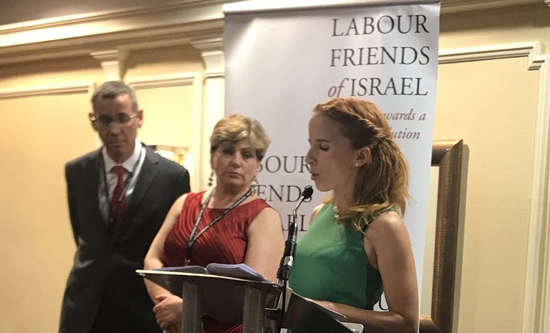
Stav Shaffir addressing the LFI conference in Brighton, as shadow foreign secretary Emily Thornberry and Israeli ambassador to Britain Mark Regev look on
Throughout the war Labour was determined to show that it supported Israel whatever the opinions of the majority of people in the country. Although on 29 December Prime Minister Gordon Brown said he was ‘appalled’ by the violence, two days later he was clearly laying the blame on Hamas:
‘I call on Gazan militants to cease all rocket attacks on Israel immediately. These attacks are designed to cause random destruction and to undermine the prospects of peace talks led by President Abbas. I understand the Israeli government’s sense of obligation to its population.’
On 3 January, as Israel began its ground attack, Brown called for Israel to ‘scale back’ its attack, saying that ‘too many’ had died. On 4 January, with 480 Palestinians dead, Brown said: ‘What we’ve got to do almost immediately is to work harder than we’ve done for an immediate ceasefire.’ He set three goals, the top priority being an end to Hamas rocket attacks on Israel, followed by an end to arms shipments into Gaza, and last of all the opening of Gaza’s border crossings.
In the first days of Israel’s attacks Britain openly blocked efforts in the UN to call for a ceasefire, on the basis that the proposed resolution did not place sufficient blame on the Palestinians. On 4 January former British ambassador Craig Murray stated on his blog that according to high level diplomatic contacts at the UN, British diplomats on the UN Security Council continued to be under direct instructions to offer ‘tacit support’ to the US’s efforts to block a ceasefire, even whilst Gordon Brown ‘appeased domestic horror at the Israeli massacre in Gaza by calling for a ceasefire’.
Meanwhile Labour ministers were expressing concern about the pro-Palestinian demonstrations. On 5 January, Communities’ Secretary Hazel Blears, who had argued on 10 December for the need to confront ‘non-violent extremism’ by Muslims, said she was ‘very concerned’ that the conflict in Gaza could foster extremism, whilst Justice Minister Shahid Malik suggested that the events were having a ‘profoundly acute and unhealthy’ effect on Muslim communities in Britain. On 8 January 14 Muslims from the government’s panel of ‘counter-extremism’ advisors wrote to Brown warning that ‘For Muslims in the UK and abroad, we run the risk of potentially creating a loss of faith in the political process.’ This is the source of the government’s concern that ‘too many’ have died in Gaza – not that they are opposed to Israel’s barbaric actions, but that they are worried about the impact on the streets of Britain.
On 15 January Brown also offered assistance to Israel to monitor Gaza’s borders, including support from the British navy, supposedly to prevent Hamas re-arming. The prospect of the deployment of the British navy coincides with renewed talks between British Gas and Israel on the exploitation of gas reserves off the coast of Gaza. These total one trillion cubic feet, equivalent to 150 million barrels of oil, for which British Gas has held a 90% licence since 1999 in partnership with the Palestinian Authority. A proposed deal whereby the gas would be exported to Israel collapsed in 2007. In June 2008, Israel approached British Gas to reopen negotiations which took place under the direction of Ehud Olmert in October 2008.
Thomas Vincent
FRFI 207 February / March 2009




